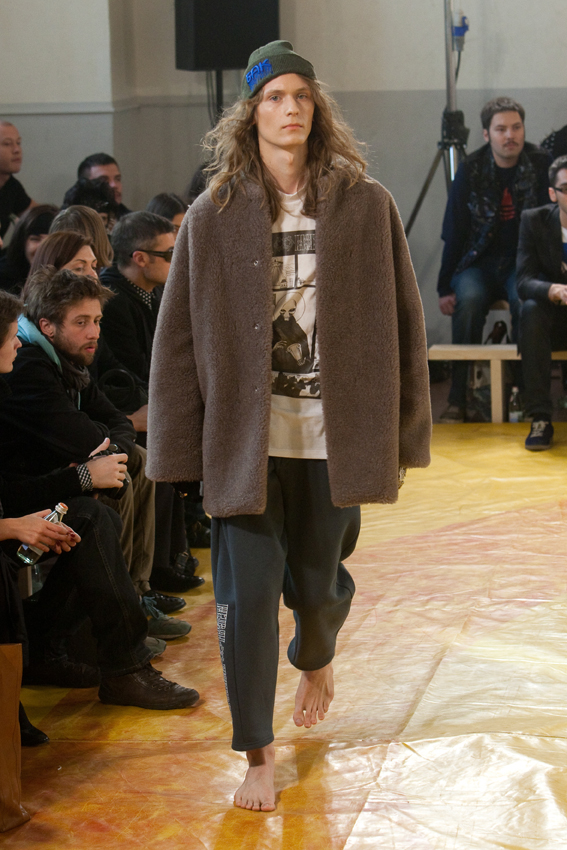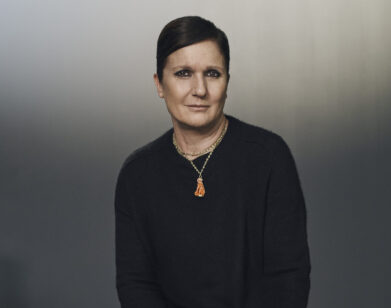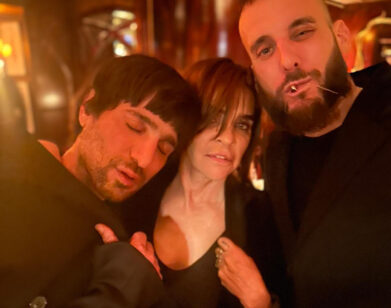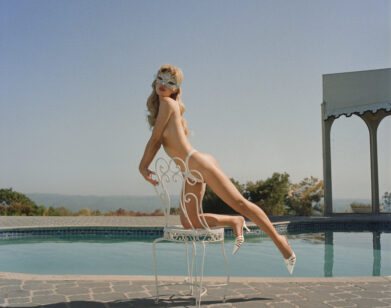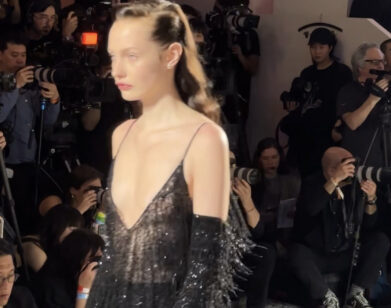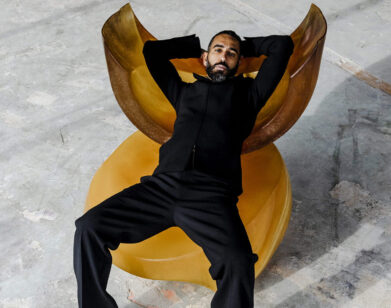From Russia, Gloves Off
Witness the recent transformations in Russia: 24-year-old Gosha Rubchinsky showed his second collection ever in an Orthodox church turned Soviety-era boxing gym, and the result looked more like a fighting arena than ever. Streetcast models wore motif-embroidered tracksuits and sweatpants, menacing death metal-inspired scarves, and fingerless gloves. The show was part of art and fashion festival Cycles and Season, Moscow’s tentative step toward a real fashion week spearheaded by Anna Dyulgerova and sponsored by Mastercard to showcase five young Russian designers and introduce foreign press to visit serious centers of contemporary culture, the various art galleries and foundations that have established themselves in Moscow in the recent years. (LEFT: PHOTO BY JOHN KAYDASH.)
Rubchinsky’s show was the hit of the week—for the designer’s exquisite streetcasting of lean, crew cutted Russian youth, the almost exclusive use of tailored cotton sweat materials, and an aggressively Russian sensibility. Dyulgerova describes Rubchinsky’s clothing as “a personal take on the fetishistic uniformity of Moscow street gangs’ post-Perestroika suburb sportswear, mixed with patriotic political paraphernalia.” We arrange to meet at Solyanka, a modern day social club and the center of all things hip in Moscow. Inside the club there’s a small concept store called Twins named, appropriately enough, for its owners, a pair of smiley twentysomething twin girls. They emphasize Russian brands, and they’re Rubchinsky’s exclusive stockists. Gosha speaks relatively little English, so we spoke through a translator about his skateboarder friends and why the new Russian designer doesn’t look to Western icons.
EMMA REEVES: Who do you make your clothes for?
GOSHA RUBCHINSKY: First of all the clothing is for my friends. They are skateboarders, all 17 and 18 years old. I wanted for a long time to do clothes and what pushed me in the end was that I met all these guys and immediately knew what they needed garment wise.
ER: How would you describe the kind of clothes you make?
GR: First of all it needs to be comfortable for something like skateboarding or graffiti writing, which you can wear to clubs too.
ER: Do you feel part of a menswear design tradition coming from Europe, or specifically Russia?
GR: Of course there are designers in Europe and America who work in this field and create clothes for this younger generation but the difference between me and them is that I create and deliver a message to Russian and Moscow teenagers. A Berlin designer would make something different for Berlin kids.
Photo by John Kaydash.
ER: Are you using specifically Russian motifs in your collection then?
GR: I can’t say if I am using Russian ornament. I am using my feelings and my impressions of growing up in post-Soviet times. Also in the matter of clothes that we used to have in these times. I remember going to the countryside with my friends and dressing weirdly because there was a shortage of all the products at this time. You were only allowed one pair of Levis jeans and one tracksuit from Adidas. You wore all this together. Not because it was stylish but because it was the only clothes you had from the West.
ER: Do young people have a desire to buy many things now because of the past?
GR: There are two different types of youth style-wise here in Moscow. One group dresses the same as any other teenager in any other city in the world. They are hipsters. The other group tries to copy the style of the early 90s with a more aggressive mix of colors.
ER: Do you aspire to show in Paris or Milan for menswear? Is it sustainable as a designer?
GR: I am quite satisfied with working in Russia, I love working here to produce clothes for Russian kids. Not only for Muscovites. I would like my clothes to be sold all over Russia and not only Moscow.
ER: Would you wish be for there to be a stronger fashion industry in Moscow?
GR: I would like to host people here, to welcome them to Moscow. All my energy and all my strengths are in Russia and I feel really comfortable being here and working here. I doubt if I would be able to do anything similar in Paris as all my friends are here and they support me and that is where I get my strength from.
ER: Will you ever learn English?
GR: No!

